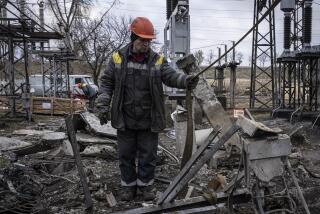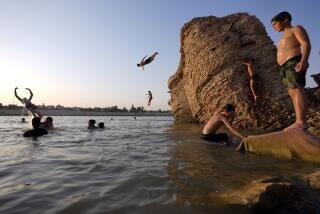Moscow Battles Fears of Cold, Hungry Winter
- Share via
MOSCOW — With winter already at the door, Soviet officials tried Monday to reassure a population frightened by erratic food supplies and growing economic chaos that they will not spend the coming months cold and hungry.
Trying to allay widespread fears that this winter will be the worst in a generation, Deputy Prime Minister Lev D. Ryabev reported to the Supreme Soviet that the country’s fuel reserves will last until spring, and Moscow Deputy Mayor Sergei B. Stankevich announced that the capital’s food stockpiles equal last year’s.
Despite Ryabev’s comforting statistics, which showed a drop in oil and coal supplies offset by a rise in natural gas, Supreme Soviet deputies took the floor, one after another, to describe areas where they knew the energy system was falling apart.
“Whole neighborhoods are frozen in Novosibirsk, Kemerovo and other Siberian cities, as well as in central Russia,” Vladimir V. Kazarezov of Novosibirsk told other members of the Supreme Soviet, the country’s legislature. “In recent years, we were saved by warm winters. If a heavy frost sets in this year, that’s the end of us.”
The onset of winter is bringing expressions of painful apprehension, both in the media and in casual conversation, as people face the possibility that the Soviet Union’s collapsing economy could leave them without food, heat, fuel and electricity.
“With its peasant history, our people have always feared winter,” Alexei M. Yemelianov, an economist and member of the national Parliament, said after the debate. “But today they’re awaiting winter with true anxiety. This winter could be not only cold and hungry, but politically explosive as well.”
Deputies blamed governmental incompetence on all levels for the energy shortfalls, particularly condemning the decision to cut capital investment across the board in order to funnel more money into satisfying the public clamor for consumer goods.
“How could they allow a cut of 30% in capital investment in energy?” Kazarezov demanded, pointing out that building houses does no good if they cannot be heated and growing more food has no effect if there is no fuel to get it to the stores.
Soviet production of oil and coal has fallen 5% so far this year, but the drop was offset by a 3% increase in natural gas production, Ryabev said. He blamed deteriorating equipment and transportation snarls for the shortfall, adding that refusal by local authorities in several areas to allow nuclear plants to operate there added to energy difficulties.
“I purposely presented statistics to show we have enough resources to get through this winter,” Ryabev said, adding that he hoped his report would prompt dissatisfied citizens to put pressure on their local governments. “(If) the resources exist and we still freeze--that’s impermissible.”
In all, Ryabev said, 40 major Soviet cities are suffering from a 10% to 20% energy shortage; among them are the Volga industrial center of Kuibyshev and Vorkuta, beyond the Arctic Circle.
Those dry statistics did little, however, to capture the utter misery of complaints like those that have poured into a special series headlined “Will We Be Warm?” now being run in the Communist Party daily, Pravda.
“We’ve been cluttering the doorsteps of officials for three years on the question of condemning our building,” read one letter from the Russian city of Nizhny Novgorod, formerly known as Gorky. “It’s impossible to live here because of the cold and damp; in the basement there is a foot and a half of water. The walls are covered with a thick layer of fungus. In the winter, our 77-year-old mother-in-law, who lives here, walks around in a fur coat and felt boots.”
“When you read about how in many cities there is no heat, and people in the capital are freezing, you’re amazed at our communal services,” V. Arshina wrote from Novosibirsk. “What are we supposed to do, when we not only have no heat, but no hot water either? Help, SOS!”
Although infamous for its merciless cold and harsh winds, the Russian winter has a generally positive image in national culture as a time of invigorating frost and jolly enjoyment.
“It’s winter--the peasant, celebrating, carves out a new path with his horse-driven sleigh,” goes a popular poem by Nikolai A. Nekrasov that Soviet schoolchildren learn.
But this year the growing difficulty of obtaining such basic foods as eggs and cheese and the prospect of political upheaval have made the onset of winter ominous; a general sense of insecurity and impending chaos is diminishing the pleasure of the crisp air of late autumn and the anticipation of the first snowfall.
Before Stankevich’s announcement at Moscow City Hall that food stockpiles appeared normal for this winter, reports had indicated that there was a major shortfall in potatoes, a key staple of the Russian diet, as well as most other vegetables.
Stankevich did not deny that supplies fell short; he said only that Moscow was working on importing all the food it needed to replenish its stocks.
To ensure enough fuel for heating and electricity, the Soviet Union has cut its oil exports, mainly to Eastern Europe, despite a desperate need to earn more foreign currency.
Supreme Soviet deputies’ criticism of the government’s energy program as shortsighted extended to the decision to discuss preparations for winter when the season was already well under way in much of this vast northern land.
“We’re at least six months late with this discussion,” Kazarezov said.
Another deputy, Vitaly Bushuyev, conveyed his disgust at government disorganization more vividly: When fuel runs out, he said, the Supreme Soviet should contribute to energy supplies by burning its own worthless resolutions and draft laws.
More to Read
Sign up for Essential California
The most important California stories and recommendations in your inbox every morning.
You may occasionally receive promotional content from the Los Angeles Times.













